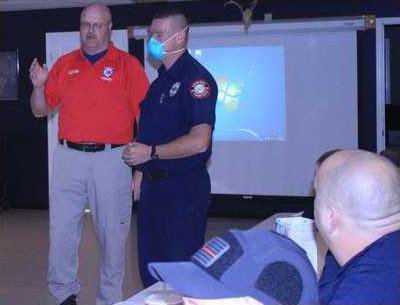Although the threat of the Ebola virus coming to Dawson County is small, Emergency Services staff members are training for a worst-case scenario.
Assistant Chief and Training Officer Danny Speaks last week discussed how to handle transporting and caring for a patient who has symptoms of Ebola.
According to the Center for Disease Control, Ebola is a rare and deadly disease caused by infection with one of the Ebola virus strains. Ebola can cause disease in humans and nonhuman primates (monkeys, gorillas and chimpanzees).
Symptoms include fever, severe headache, muscle pain, weakness, diarrhea, vomiting, abdominal pain and unexplained hemorrhage. The CDC says symptoms may appear anywhere from two to 21 days after exposure to Ebola, but the average is eight to 10 days.
Three people in Dallas, Texas, have been diagnosed with the disease. The first entered the U.S. from West Africa. The other two were healthcare workers assisting in the first victims treatment. They since have been transported to Atlanta for treatment. The first victim died.
Speaks warned the staff that being prepared will be the key. You guys are the ones that are on the front line having to deal with this, Speaks said.
The hospital is going to have time to get ready for this-you guys are going to have minutes.
Emergency Services training includes knowing signs and symptoms of the virus, and wearing proper gear to enter a home of someone possibly infected, and how to disrobe gear after exiting the home.
We are doing everything we can to prepare to make sure our citizens are taken care of, Sparks said. We want this to be a non-issue here. We are going to be prepared, and were going to take effective steps to make sure theyre taken care of.
Training also begins when an E-911 operator takes a phone call. Emergency Services Chief Lanier Swafford and E-911 Director Debra Wimpy are working together to focus on a series of questions for operators to ask to determine whether or not Ebola should be suspected. The main question will be the patients recent travel history. I would use travel as a real precursor, Speaks said.
Swafford said it is Emergency Services duty to take a proactive stance in times of uncertainty and disease outbreaks. The role of Emergency Management, he said, is to assure the community is educated as to the situation, that planning occurs to protect the community and the healthcare providers, that mitigation measures are put into place, and that situational awareness remains at a high level.
Swafford went on to say that in addition to staff training, Emergency Services is working with community partners to develop a plan, should Ebola hit the area.
For the time being, Swafford advises community members to be aware of latest updates about the virus. The most important thing to remember at this time is that Ebola is a real threat, he said. It is different from pandemic influenza outbreaks as Ebola is more situational awareness-driven whereas influenza is a prevention-driven effort. Monitoring the media, verifying good information and maintaining a high level of situational awareness is the best information I can give at this time.

